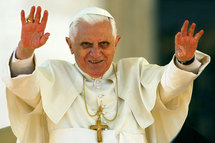Pope heads to Cuba after call for change
Michael Langan
SANTIAGO, Cuba, Michael Langan- Pope Benedict XVI headed Monday to Cuba hoping to boost the Catholic Church's special dialogue with the Communist regime, as dissidents said more than 150 were arrested to thwart demonstrations.
Benedict, who departed from Mexico after a four-day visit, is seeking to bolster close church-state ties in Cuba while also urging authorities to embrace change.

Meanwhile Cuban authorities have rounded up at least 150 dissidents in the past few days to stop any demonstrations during the two-city papal visit, the head of an opposition group told AFP in Havana.
"So far the Cuban Human Rights and National Reconciliation Commission can confirm that in the past four days at least 150 peaceful dissidents have been arrested," said Elizardo Sanchez, head of the illegal but long tolerated dissident information clearinghouse.
"They were roundups to prevent" problems during the visit of Pope Benedict XVI who was due to arrive in Santiago, Cuba, on Monday and also visit Havana.
Sanchez said a similar number of activists who were not detained have been blocked from leaving their homes or attend mass or welcoming activities along the route the pope will travel.
At least 15 of those detained were members of the Ladies in White, a prominent group of wives and family members of jailed political opponents, according to the dissidents.
The pontiff, 84, was due to leave Mexico Monday and arrive in southeastern Santiago, Cuba's second largest city, at 1900 GMT.
Santiago is just down the mountain from Cobre, home to an important shrine marking its 400th anniversary this year.
A crowd of up to million people, out a population of about 11 million, were expected to turn out for mass at 2230 GMT -- about the same numbers, authorities say, as welcomed Pope John Paul II like a rock star 14 years ago.
Early Monday, groups of dozens of teenagers were streaming to the mass venue here, decked out in white souvenir T-shirts that read "Welcome Benedict." A "human chain" of wellwishers also is expected to greet the pope.
John Paul II's 1998 trip was the first papal visit to Cuba. And expectations were high then that the charismatic Polish pontiff, who had been linked with anti-communism movements, might stoke hurricane-force winds of change in Cuba after decades of centrally-run government, economy and media.
The Polish pope did indeed help start a steady thaw, and then cooperation, in local Catholic relations with the Cuban government. Decades of official atheism in Cuba had ended just in the early 1990s.
But more than a decade later, despite John Paul's calls for Cuba to "open up to the world," it remains isolated, its economy still centrally planned. Most Cubans earn under 20 dollars a month.
The Roman Catholic church, though a religious minority in Cuba, has emerged as the most important non-state actor, even mediating prisoner releases. But it does not enjoy a free rein on the Caribbean island.
President Raul Castro, 80, and revolution icon Fidel Castro, 85, were partly educated in Catholic schools, yet the church still does not have its own media or education system.
While Latin America is largely Roman Catholic, Cuba is decidedly less so. And Roman Catholic church officials say Benedict, who is German, is keen to spark new and renewed faith.
But he also has had to walk a fine line amid rising calls for more opening up than the Cuban government has sought so far.
"The Holy See knows the ideological positions of the Cuban government" and the government "is aware of the views of the Church," said Archbishop Dionisio Garcia of Santiago de Cuba.
Benedict XVI has no plans to meet with members of the Cuban opposition. The pope "knows the Cuban reality" and the fact "he meets with the opponents or not does not mean he is unaware" of their situation, Garcia said Saturday.
"They (all parties) want this (visit) to be constructive and positive in tone," Wayne Smith, the top US diplomat in Havana from 1979-1982, told AFP.
Even if dissidents may feel they are getting a cold shoulder "the church is in any event, more on the side of the dissidents than of the government," said Smith, director of the Cuba Program at the Center for International Policy in Washington.
In Santiago, a white metal framework of classical church arches towers over the altar where Benedict is to give his mass. Cuban authorities have carefully readied the mass venue for days, setting up crowd barriers and staging soundcheck after soundcheck.
----------------------------------------------------------------------------------------------------